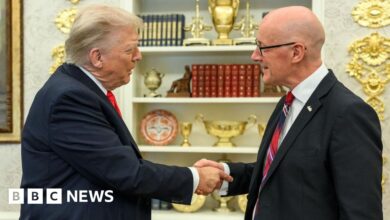Labour’s big Budget and Kemi Badenoch’s win reset politics – Laura Kuenssberg
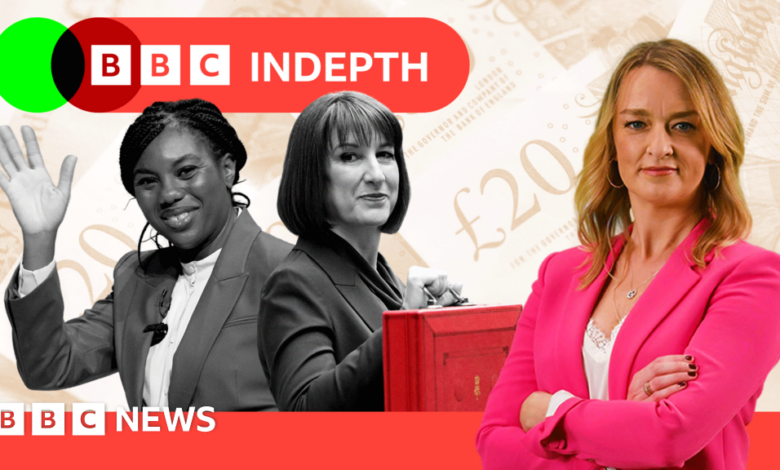
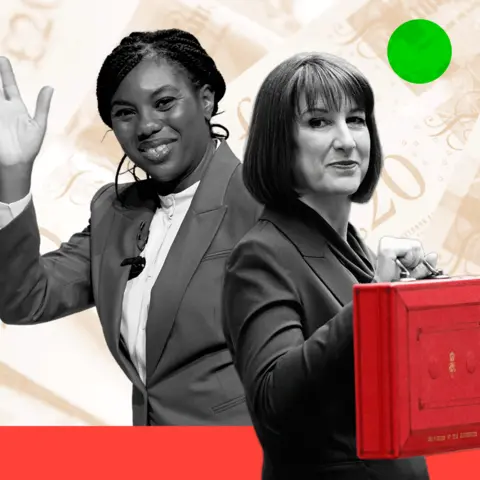 BBC
BBC“It’s like week zero,” a government insider suggests. A new Conservative leader today. A whopper of a Budget on Wednesday.
Add those two events together and it feels like this is the week that everything changed – the clock restarts.
The tramlines are now set for the battles ahead, a member of the cabinet tells me. A Labour government that’s now unabashed in the big choices it’s made, the winners and losers they’ve picked.
Kemi Badenoch, the new Conservative boss, is unashamed in saying what the softer fringes of the Tory party has felt squeamish about until now.
And maybe we’ve entered a new era when the fabled centre ground of politics feels a bit emptier – and the differences between the two main parties are sharper.
The consequences of the Budget are still emerging, and the real effect won’t be clear for many months. There has been no huge unravelling, but ministers are still incredibly aware they’ll still need to explain it.
If your doorbell rings this afternoon and it’s a grinning person with a red rosette and a leaflet, you’ll know what they’re up to.
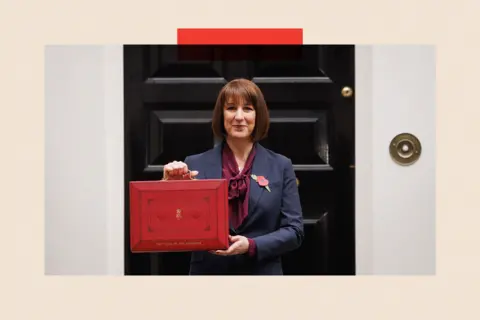 Getty Images
Getty ImagesThe party knows the decisions, particularly to whack billions on employers’ national insurance, have caused some anxiety among some voters. This will also hit GP practices and charities, which have flagged fears about the cost of the change – and no government wants to go to war with them.
No minister wants to have to defend a decision that looks to many voters and their rivals, like they were misled, after promises not to raise National Insurance in the election.
The government rejects the charge – insisting they only promised to not raise the National Insurance paid by employees, rather than employers.
But Labour is having to learn what it’s like to take the flak. To wobble on the big decisions would be politically disastrous. And in Downing Street there’s confidence the public is broadly onside.
Insiders say No 10’s focus groups – which have been asked about the Budget in the last few days – have understood the decisions, reporting some grumbles but not much sign of outrage.
One government source says, “people looked at the Budget and said, ‘that makes sense’. That is a platform we can build on.”
The decisions, and the government’s true motivations – are out there now in black and white. The source says “it’s the first time – certainly in government, probably in the whole project – we have been able to show, rather than just tell.”
However, after all of Labour’s schmoozing of the business world, and all their emphasis in the election of growing the economy, there’s been some surprise that those arguments were a lot less prominent on Wednesday.
Sources say phase one was concentrating on the public finances and public services, then the next part will be more emphasis on growth with a big speech from Rachel Reeves at the Mansion House in the City soon.
A senior business leader told me, “they’ve done part one well, in a more traditional Labour way, but to get a real shape, they need a very strong part two… creating the vision, energy and specific incentives and plan for growth and wealth creation – that still needs work.”
On the other side, Labour’s union backers are pleased with extra cash for some public services, and the tweaking of the borrowing rules so more money is available to spend on long-term projects.
But there’s concern, as one leader puts it, that the NI rise for employers will be “raised in every negotiating room”, as an excuse for lowering wages. And unhappiness on the left about the two-child benefit cap, and the winter fuel allowance, remains – with a judicial review of the decision on those pensioner payments in the offing.
But forget the inevitable skirmishes and stresses. The Budget has filled in many of the blanks about this government, answering part of that common question: what does Keir Starmer really stand for?
And the response could almost be a line from a Gordon Brown Budget of days gone by – economic stability, more public spending, with schools and hospitals at the top of the list.
Starmer’s backers says the discipline on day-to-day spending – even cuts to some departments – makes it different to Labour Budgets of the past, claiming they have taken the Conservatives’ mantle for being the party you can trust with public money.
But no doubt the Budget illuminates the priorities of classic Labour instincts, not the mushy middle.
A government source suggests none of it should really be a surprise.
“Traditional centre-left arguments were were all there in the election – ending non-doms, VAT on private schools – overall it passes the fairness test and that is the most important thing.”
“Labour in its veins,” says a cabinet minister. And in the next few weeks Labour will publish what’s been described as a “programme for government” that will make it even more clear.
New Conservative chapter
The sharper shape makes life both easier and harder for the brand new Conservative leader, Kemi Badenoch.
It’s more straightforward perhaps if Labour’s stripes are more red, the Tories can portray themselves a deeper blue.
Kemi Badenoch has been deliberately light on policy, but her principles are clear. She believes in free markets and a smaller state. It’s not going to be hard for her to draw a contrast to the government. “It’s back to the future,” one Tory source tells me.
“We can go back to first principles, as we did in the 70s and the early 2000s,” opposing bigger government and bigger taxes.
Another senior party figure suggests the Budget has already sketched out an obvious path telling me, “the government has positioned itself as distinctly post-new Labour.
“It is workerist, it’s not very nice to farmers or rural areas – with pensioners and farmers you see that you have a coalition where the Tories can get back to 250 seats.”
Badenoch’s backers are sure that she can satisfy the first task of opposition, getting noticed. Opposition parties don’t have an automatic right to get attention.
One supporter was convinced that “whatever happens, she will be an attention-gatherer.” But Labour reckons their Budget choices have sent plenty of traps for the brand new leader.
It might seem natural to the Tories to vote against the government’s tax rises in the Budget. But it’s a lot less comfortable to oppose extra cash for public services.
It’s one thing to stand against charging private schools VAT. But will the Conservatives oppose the new teachers for state schools the tax rise is meant to support? That is a far harder argument to make.
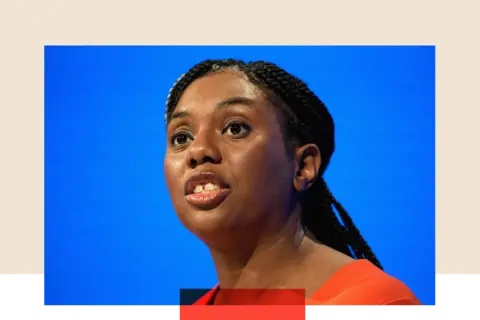 Getty Images
Getty ImagesLabour’s decisions mean, despite Badenoch’s broad-brush approach, the Tories are going to be expected to have something to say about schools and hospitals – services the public relies on.
A senior Conservative figure warns that this week has “set up a public services Parliament … you can’t go through a sustained period of time when you just rely on the vibes.”
As Chris has written, the task for Badenoch is massive. Not just because of the July’s battering that depleted their numbers so much, but because the Conservatives have been in the groove of attacking each other for many years now.
The party is described by sources as “fractious”, and “deeply sceptical”. Getting rid of leaders became almost the norm.
One of the contenders for the job joked when courting votes they’d even been told by one former minister: “I’m more interested in the leadership race in two years time.”
Badenoch has won a clear mandate, but by a smaller margin than in races that have gone before.
There is no doubt she is a politician that stands out, another Conservative says, referencing an old TV ad: “She has the potential to be Heineken – reaching the parts of the electorate other Tories cannot.”
But her style has risks – “like a can of Heineken, if shaken up too much, it can froth everywhere,” and make a terrible mess.
Today we start a new chapter. One Conservative source suggests we’re back in a “classic left-right era”.
A Labour government that has expressed its priorities with big borrowing, big spending and big tax that believes the public is on board, after years when Budgets at home and in Whitehall have been under so much pressure.
And an opposition with a new leader who believes in something completely different. Don’t forget of course the smaller parties, Reform, the Lib Dems, the SNP and Greens, have important roles too.
But the contours of the central contest feel sharper now.
For years politicians, whether Labour or Conservative, have liked to suggest that we can drift towards lower taxes and still have the kind of public services of countries where the government spends much more cash.
Perhaps this week might mark the moment when our politicians stop telling us we can have it all.
A former cabinet minister suggests now we’ll be much less like ‘the stepping stone’ between America and the rest of Europe. Politics is an ever-shifting kaleidoscope but Labour’s enormous Budget has set new terms.
And with the new Tory leader, we move into a new era. Mark the date, as one government source notes: “It is the week when we know the politics of this parliament.”


BBC InDepth is the new home on the website and app for the best analysis and expertise from our top journalists. Under a distinctive new brand, we’ll bring you fresh perspectives that challenge assumptions, and deep reporting on the biggest issues to help you make sense of a complex world. And we’ll be showcasing thought-provoking content from across BBC Sounds and iPlayer too. We’re starting small but thinking big, and we want to know what you think – you can send us your feedback by clicking on the button below.





